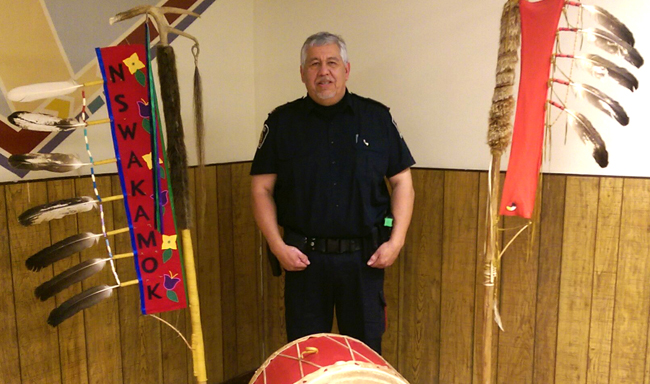When opportunity knocks: Sudbury’s first native police officer retires

By Laura E. Young
SUDBURY – Police work is all about helping for Sudbury’s first native police officer.
As Grant Dokis retires after 30 years at the Greater Sudbury Police Services, he recalls how that very image of serving the community is what initially drew him to the profession.
He is returning to Dokis First Nation and seeking a position on band council. The time is right, he believes.
“I want to give back to my First Nation community. For me (retirement) was personal. I want to leave when I’m healthy. I want to do more things back home. I like the bush, the lakes. That’s where I grew up.”
Drawing on the strong value in which his parents placed on education and work in Dokis, he pursued his schooling.
When he sought a career, initially he wasn’t interested in policing. A ride with his older brother, however, changed his mind. His brother is a band officer. “I always saw myself as a helper. That’s how I became interested.”
Policing also meant job security and opportunities. Sudbury was a self-sufficient operation with many policing options.
“I knew I was going to have a family some day and I wanted my kids raised in an urban environment. There’s education and more opportunities,” says Dokis.
He and his wife of 28 years, Francine, have two children: Ross and Lina.
Still it wasn’t easy being the first Native officer. Sudbury’s urban aboriginal population is growing. According to the 2006 survey from Statistics Canada, Sudbury’s aboriginal population was 6.4 per cent or nearly 10,000 people, half of which were Métis.
In a small city with an even smaller Aboriginal community, it wasn’t always easy being an officer, either inside the force or on the streets.
“No one is perfect,” he laughs as he recalls that there was some racism. He chose to deflect it and move on. “My big point was to try and present that I could do this job just as well as my co-workers.”
Police like to use humour, too, he adds.
Once a suspect, who knew he was a native officer, called him “a wagon-burner. My co-worker said, ‘I’ve been working with Grant for a year and a half and I haven’t seen him burn a wagon yet.’”
During his years in the GSPS, he served out on patrol, as a plainclothes officer and in the tactical unit. He helped create the Aboriginal Liaison Unit. At the time it was only the third such unit in Ontario, he recalls.
It was another opportunity and one that meant he could begin doing his part to chip away at the hard rock of mistrust between members of the native community and the police.
He also helped create the MKWA police ride along program, named after the bear and the mighty symbol of protection a bear gives.
The program is in its 11th year and 16th session. Since 2005, 170 students have spent the day riding on patrol with Sudbury police officers.
Anna Barsanti, the youth education coordinator, has worked with Dokis on the Mukwa program for 11 years.
“He is the reason Mukwa has lasted,” Barsanti says.
Dokis enlisted all four school boards and built the relationships with youth, the schools and the police, she says.
He has left an indelible legacy, she adds.
“Grant is about love of family, people, respect, honesty, building bridges, creating safe spaces, and yes, let us not forget, winning at hockey.”
Dokis also served on various GSPS committees, ranging from multiracial multicultural relations to aboriginal homeless support to community gang resistance strategy, and the Missing and Murdered Indigenous Women Community Committee.
For Barsanti, Dokis is a great listener and his response to any challenge was simple – “It will all work out.”
Dokis hadn’t joined the police to become the native liaison officer but he remains happy with how it evolved.
“At first I knew enough of my culture to go and see guidance from elders. I got their wisdom and offered some tobacco to the elder to guide me down the right path. From there we have developed the aboriginal advisory committee.”
Building trust didn’t happen overnight, but he was known in the community, especially through sports, he adds.
Eventually he was not the only aboriginal officer. In one year the GSPS hired three aboriginal officers at once, an accomplishment that nearly left him in tears, he says.
“They’re doing well. One I recruited personally. That was so satisfying.”
And it wasn’t just indigenous officers 30 years ago. There were no women or minorities In general, he recalls.
Today there are over 20 aboriginal persons on staff in various positions: “Diversity has really changed. That makes me proud. I see a native person working on my in-car computer. That brings joy to me,” he says.
Constable Shannon Agowissa will replace Dokis as the aboriginal liaison.
Links: http://www.northernlife.ca/news/policeandCourt/2006/10-20-06-bad-guysTOP.aspx


